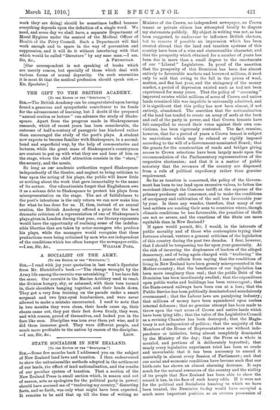THE GIFT TO THE BRITISH ACADEMY.
[TO THE EDITOR OF THE "SPECTATOR.'']
Sin.—The British Academy can be congratulated upon having found a generous and sympathetic contributor to its funds for the advancement of learning, but I doubt if the proposed "annual oration or lecture" can advance the study of Shake- speare. Apart from the progress made in Shakespearean research, which of recent years has been considerable, the outcome of half-a-century of panegyric has hindered rather than encouraged the study of the poet's plays. A. student now expects to become familiar with Shakespeare, in a second- hand and superficial way, by the help of commentaries and lectures, while the great mass of Shakespeare's countrymen are content to put up with what they see and hear of him on the stage, where the chief attraction consists in the " stars," the scenery, and the music.
So long as our academic authorities regard Shakespeare independently of the theatre, and neglect to bring criticism to bear upon the acting of his plays, the public will know little or nothing about the work that gave immortality to the name of its author. Our educationists forget that Englishmen owe it as a solemn debt to Shakespeare to protect his plays from misrepresentation on the stage. The act of faithfulness to the poet's intentions is the only return we can now make him for what he has done for us. If, then, instead of an annual oration, the British Academy offered a prize for the best dramatic criticism of a representation of one of Shakespeare's plays given in London during that year, our literary exponents would have the opportunity of realising some of the indefen- sible liberties that are taken by actor-managers who produce his plays, while the managers would recognise that these productions were being criticised by men who are independent of the conditions which too often hamper the newspaper critic.














































 Previous page
Previous page